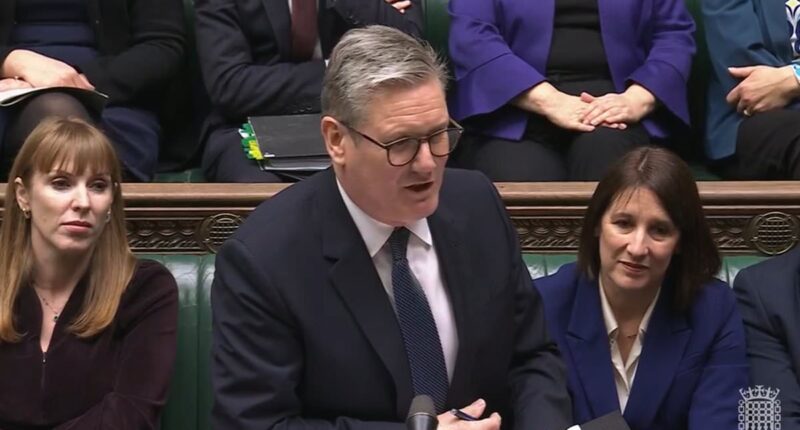Keir Starmmer today dodged repeating his vow for the UK to have the fastest growth in the G7 during PMQs clashes.
The premier was challenged over the pledge by Kemi Badenoch as they faced off in the Commons this lunchtime.
Sir Keir merely pointed to a new OECD report, arguing that it had ‘upgraded’ growth forecasts for the UK.
But the Tory leader retorted: ‘He can’t even repeat the pledges that he made just a few weeks ago.’
Ms Badenoch also insisted the international body had warned that the government will be ‘coming back for more taxes’ after the record Budget raid.
Last week Chancellor Rachel Reeves seemed to promise there will not be any more tax rises in this Parliament – but she has since backtracked.
The spat came as the Bank of England governor described the impact of the national insurance increase as the ‘biggest issue’ after the Budget.

Keir Starmmer today dodged repeating his vow for the UK to have the fastest growth in the G7 during PMQs clashes

The premier was challenged over the pledge by Kemi Badenoch as they faced off in the Commons this lunchtime

The Organization for Economic Cooperation and Development (OECD) has reduced its prediction for the UK’s economic growth this year from 1.1% to 0.9%. However, it mentioned that there would be an increase in economic activity in the following years because of Rachel Reeves’ boost in government spending.
Following the Commons exchanges, Downing Street tried to clarify that the Government remains committed to the G7 target. There have been claims it is being sidelined, with seemingly little prospect of reaching the goal as the US is surging ahead.
The PM’s official spokesman said: ‘You have heard the PM repeatedly say that the growth mission is the number one priority of this Government and its obviously welcome news that today the OECD has upgraded the UK growth forecasts, which means the UK economy is forecast to grow faster than Germany, France, Italy and Japan over the next three years.
‘And the reason that’s important is because it is growth that drives living standards and the Government’s been clear that we want to see the benefits of growth to be felt by working people across the country.’
Asked to repeat Sir Keir’s previous pledge to make the UK the fastest-growing economy in the G7, the spokesman said: ‘We remain committed to that mission.’
In its annual economic survey, the OECD predicted that both interest rates and inflation will be above previous expectations.
The OECD also trimmed the forecast for UK growth this year from 1.1 per cent to 0.9 per cent – although it said activity would accelerate after that due to Rachel Reeves’ state spending bonanza.
And it cautioned that the government will need to ‘mobilise additional revenue’ by closing tax loopholes to balance the books.
In her October 30 package Ms Reeves set out plans for almost £70billion a year of extra public spending, funded through tax rises and increased borrowing.
The OECD said interest rates, which currently sit at 4.75 per cent, are likely to fall back to 3.5 per cent by early 2026.
However, higher consumption, partly caused by the autumn Budget, meant the drop would not be as sharp as previously forecast.
The report said: ‘Fiscal policy will be tightening over 2024-26, though by less than expected, with significant fiscal loosening in the tax, spending, and borrowing package announced at the autumn Budget.’
The OECD has pencilled in headline inflation of 2.7 per cent for next year.
It had previously pointed towards inflation of 2.4 per cent for 2025.
The rate is expected to fall to 2.3 per cent in 2026, but that is still above the Bank of England’s 2 per cent target.
Meanwhile, UK GDP is predicted to rise by 0.9 per cent this year, a downgrade from 1.1 per cent after recent official figures showed the economy stalling in the third quarter.
‘Momentum is positive nevertheless, with retail sales on an upward trend since early 2024,’ the report added.
GDP growth is now projected to strengthen to 1.7 per cent next year as it is ‘boosted by the large increase in public expenditure set out in the autumn budget’.
That will fall back to 1.3 per cent in 2026.

In its annual economic survey, the international body predicted that both UK interest rates and inflation will be above previous expectations

The OECD said the UK remains vulnerable to an increase in energy prices
Previously, the OECD had forecast 1.2 per cent GDP growth for 2025.
The OECD suggested that Ms Reeves promises of no more tax rises might prove difficult to keep.
‘Rebuilding fiscal buffers and continuing to mobilise additional revenue, including by closing loopholes and reducing distortions in the tax system, is necessary to ensure fiscal sustainability,’ the report said.
It added: ‘With limited fiscal buffers, possible external shocks that would require fiscal support are a significant downside risk to the outlook.
‘These include increases in global energy prices, given UK households’ reliance on natural gas.
‘Moreover, persistent price pressures on the back of the strong increase in government expenditure and uncertainty about the degree of slack in the labour market could require the monetary stance to remain tighter for longer.’
Ms Reeves said today: ‘Growth is our number one priority, and the OECD upgrade will mean the UK is the fastest growing European economy in the G7 over the next three years.
‘That is only the start. Growth only matters if it’s matched by more money in people’s pockets.
‘That is why we protected people’s payslips from higher taxes at the Budget and are determined to deliver growth that benefits households and improves living standards.
‘This government will get our economy growing, with our National Wealth Fund, reforming the remits of our regulators and pension mega funds to attract better investment, as well as reforming our planning laws – all so that we can rebuild Britain for good.’
The OECD said the global economy would ‘remain resilient’ over the coming years but that ‘risks and uncertainties are high’.
World GDP is predicted to grow by 3.2 per cent this year and 3.3 per cent next year.
That is a slight improvement from the 3.1 per cent and 3.2 per cent from its September interim report.

















